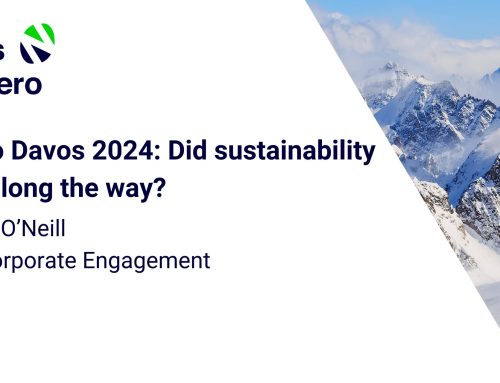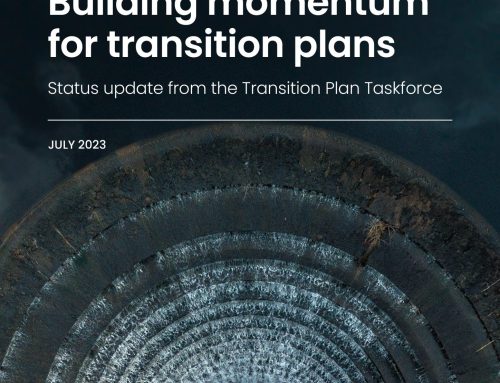Yesterday (14 August), the UK Government’s Department for Energy Security and Net Zero (DESNZ) called on all sectors to develop their own business roadmaps, using the Net Zero Council’s new business roadmap framework. On the same day, it also launched the UK Business Climate Hub to provide SMEs with new advice and support to reduce their emissions.
What is the Net Zero Roadmap and what does it mean for businesses?
The Net zero business sector roadmap guidelines, published as part of the Council’s SMEs guidance, aims to encourage businesses to create tailored action plans to reduce emissions across their sector. The roadmap has been developed by the Net Zero Council to help their own industries decarbonise.
The Net Zero Council is formed by Government and industry, and co-chaired by Energy Minister Graham Stuart and Co-op Group CEO Shirine Khoury-Haq to provide a collaborative forum to unlock the opportunities of the green transition. In May 2022, Bankers for Net Zero were invited by Minister Stuart to join the SME working group on the Net Zero Council.
The roadmap includes two sets of criteria and two points regarding “enablers for collaboration”:
- A credible pathway aligned to HMG’s Net Zero Strategy
According to the criteria, the roadmaps should outline a comprehensive set of actions, illustrating the routes to reduce emissions across scope 1, 2, and 3 categories. They should also incorporate strategic measures that empower the sector to contribute effectively to a broader economy-wide transition, ensuring any utilization of carbon offsets is openly disclosed and aligns with sector-specific Net Zero strategy assumptions. These roadmaps must present practical deployment data that aligns with the emissions trajectories, as well as pinpoint governmental policies that provide support. Furthermore, they should assess the sector’s energy requirements and its overall preparedness level, while also showcasing interdependencies with other sectoral routes and the broader net zero initiatives.
- Robust delivery plan and structures
Regarding delivery and structures, the plan outlines that the foundation of a strong net zero implementation strategy and framework necessitates the formulation of a transparent plan detailing the essential steps for realizing the emissions reduction paths, alongside securing substantial engagement from sector businesses. This initiative should be bolstered by the necessary resources and capabilities to ensure effective execution, with mechanisms in place to monitor, evaluate, and make corrections as required. A commitment to annual public progress reports, complete with well-defined key performance indicators for all decarbonization endeavours, is essential. Moreover, recognizing the significance of both behavioural shifts and technological adaptations is crucial to adopting a comprehensive implementation approach. The strategy should also account for the involvement of SMEs in the execution process.
- Collaboration on barriers, gaps and dependencies
The roadmap plan should set out a collaborative approach to address obstacles, deficiencies, and interdependencies, involving consistent recognition of barriers and gaps, notably financial hurdles. This includes utilizing the Net Zero Council as a means to surmount obstacles and gaps, while also employing the cross-economy roadmap tool to identify dependencies and ensure their resilience and proper sequencing.
- Independent assessment of roadmaps to ensure credibility
The roadmap emphasizes the necessity for an unbiased evaluation of the roadmaps to maintain their credibility. This involves sectors detailing their adherence to the criteria outlined in points 1 and 2, along with an impartial appraisal of the roadmaps’ alignment with the criteria, encompassing both the proposed trajectory and the implementation plan.
Overall, these industry-specific roadmaps will serve as invaluable aids to companies spanning the entirety of the country as they navigate their journey towards achieving net zero status.
The UK Business Climate Hub
Alongside the Net Zero Roadmaps publication, DESNZ launched the UK Business Climate Hub which is aimed at supporting the 5.5 million SMEs in the UK reduce their emissions. The Hub is a collaboration between the UK Government, businesses and business groups across the UK and is backed by the Net Zero Council.
The Hub is the UK partner of the SME Climate Hub which is a global initiative to empower SMEs to take climate action. The hub offers comprehensive net zero guidance spanning diverse areas, including procuring goods from environmentally conscious suppliers, curbing emissions in shipping and logistics, and identifying the most economical approaches to implementing solar panels and electric vehicle (EV) charging stations. It also features a complimentary carbon calculator along with a range of other resources aimed at aiding businesses in gauging, monitoring, and disclosing their emissions. Moreover, it assists in cost reduction through decreased energy consumption.
Members of the coalition include British Business Bank; British Chambers of Commerce; Confederation of British Industry (CBI); Electricity North West, Federation of Small Businesses (FSB), and HSBC, among others. Institute of Environmental Management and Assessment (IEMA).
Bankers for Net Zero work on SMEs
Bankers for Net Zero set up a working group on SMEs in November 2020. The group works on helping SMEs transition to net zero by bringing together industry stakeholders and the Government to make sure SMEs have access to the resources necessary to embark on their own net zero journey.
Additionally, Bankers for Net Zero chairs the SME Advisory Group for the Transition Plan Taskforce which is focused on sustainability reporting and developing sector specific recommendations to accelerate credible transition plan guidance for SMEs. This will consider guidance for banks on how to engage SMEs on creating transition plans as well as wider industry standards to support access to transition finance . Insight from this project will feed into the TPT’s forward looking pathway document, published in Spring 2024 when the TPT comes to the end of its mandate.
If you would like to get involved with this project, please contact the Bankers for Net Zero team.


